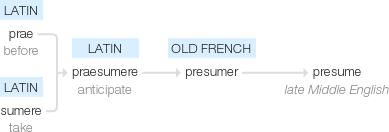Presume
late Middle English: from Old French presumer, from Latin praesumere ‘anticipate’ (in late Latin ‘take for granted’), from prae ‘before’ + sumere ‘take’.
wiktionary
From Anglo-Norman presumer, Middle French presumer, and their source, Latin praesūmere(“to take beforehand, anticipate”), from prae- + sūmere(“to take”).
etymonline
presume (v.)
late 14c., presumen, "to take upon oneself, to take liberty," also "to take for granted, believe or accept upon probable evidence, presuppose," especially overconfidently, from Old French presumer (12c.) and directly from Latin praesumere "anticipate," in Late Latin, "assume," from prae "before" (see pre-) + sumere "to take, obtain, buy," from sus‑, variant of sub‑ "up from under" + emere "to take" (from PIE root *em- "to take, distribute").
To presume is to base a tentative or provisional opinion on such knowledge as one has, to be held until it is modified or overthrown by further information. [Century Dictionary]
The intransitive sense of "to venture beyond the limits of ordinary license or propriety" and that of "to press forward presumptuously" are from early 15c. Related: Presumed; presumedly; presuming; presumingly.
